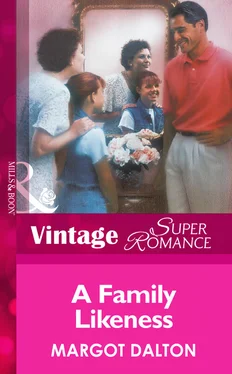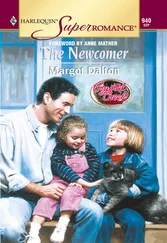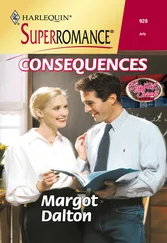“What…what was your wife’s illness?” she inquired hesitantly. She knew she was prying, but something about the man compelled her to ask.
“She had Huntington’s,” he said, still staring at the lake.
“Oh,” Gina murmured, wrung with sympathy. “Oh, I’m so sorry.”
She was silent a moment, trying to remember what she’d heard about the condition. “I always thought…” she began.
He turned to face her. “Yes?”
“About Huntington’s. I thought it didn’t affect people until quite late in life.”
“Usually it doesn’t,” Alex said. “But it can strike in the early thirties. That’s when my wife first started to develop symptoms—about ten or eleven years ago. Her father and an uncle both died of it,” he added, “so we knew what to expect. But the children of people with Huntington’s still have a fifty percent chance of escaping it.”
“And until the symptoms appear…”
“You keep hoping,” he said bitterly. “You cling to hope until the last minute. You tell yourself maybe the tremors are just fatigue, and the dizziness is some kind of allergy. You grasp at straws as long as you can.”
“But hasn’t a test been developed recently? I thought there was some kind of genetic marker that can be isolated and identified.”
“That’s true,” he said, looking at Gina in surprise. “You’re very well-informed.”
“I watch public television,” she said, “and read a lot. I’ve always had an interest in scientific things.”
“Of course you have,” he said with a quick smile. “Anybody can tell that by looking at the things you carry in your pockets.”
She smiled back. “My mother was a chemistry teacher until she retired a few years ago. She always encouraged me to have an inquiring mind.”
“What about your father?”
Gina tensed, reluctant to get into a personal discussion. But he’d told her about his own family tragedy, so it seemed graceless not to respond to his questions.
“My father was in sales,” she said. “He traveled a lot. When I was about eleven, he left on a trip to Ontario and wound up staying there. My mother raised us all alone.”
“Us?”
“I have a sister who’s ten years younger than I am. She and my mother live in New Brunswick. I came out here almost twenty years ago to go to college, fell in love with the province and never left.”
“Why did you decide to go to school so far from home?”
“I have an aunt who lives in Vancouver near the university,” Gina said. “It was cheaper to stay with her than in a dormitory somewhere. And UBC offered a really good course on hotel management, which was always my career choice.”
“I see.”
Alex leaned back again, lifting his face gratefully to the warm rays of sunlight.
“In answer to your question about testing,” he said after a brief silence, “it was something my wife never wanted to do, even after the test became more readily available. She said she refused to live with a death penalty over her head. As it happened, the disease progressed a lot more rapidly than is usual once the symptoms appeared, so maybe she was wise.”
Maybe, Gina thought. But it wouldn’t have been her own choice. She always preferred to know what she was dealing with, to confront the reality head-on no matter how awful it might be. She wondered about Alex’s daughter, though. Had she been tested? Surely—
Alex suddenly got to his feet, then waited courteously while she did likewise. “We’d better get this deal concluded,” he said. “I have to be back in Vancouver before nightfall.”
She walked with him back into the hotel, relieved that their painful conversation was ended.
But as they strolled through the hallway with Annabel at their heels and paused in the kitchen to greet Mary, Gina was alarmed to realize she was already counting the days until the first of July…
ROGER STROLLED into the kitchen and patted Gina’s shoulder as she worked at a little side table near the window.
Outside, the late-evening sun was setting behind the mountains, casting long purple shadows across the yard. The lake glistened with fiery streaks of orange, and the twilight air was warm and murmurous with crickets and the music of bullfrogs by the water’s edge.
“What’s this one?” he asked.
Gina squinted at the scrap of wire and golden feathers in her vise. “A yellow nymph,” she said. “Like the ones I made last year, but with some minor improvements.”
“Those yellow nymphs were great flies. Remember the big trout I caught, Gina?”
“How could I forget? You’ve mentioned it practically every day for the last year.”
“You’re just jealous,” he said placidly. “We should try to get up to Bear Creek again. We’ve hardly been fishing at all this spring, and June’s almost over.”
Gina sighed, winding her thread carefully. “It’s always so busy around here.”
“Well,” Roger said, pouring himself a cup of coffee from the pot on the counter, “if we wait till we’re not busy, we’ll never go.”
“That’s certainly true.” Gina frowned at the partly shaped fishing fly on her vise, then rummaged in a tackle box full of colored feathers, scraps of fur and spools of thread. “I think I’m going to add some black antennae,” she said. “Something that wobbles a bit.”
“Do nymphs have antennae?” Roger asked.
He crossed the room to the big oak table, the antique lights overhead reflecting on his bald pate with its scant fringe of silver.
“Who cares?” Gina said cheerfully. “Never question an artist. I’m the one who tied the fly that caught your prizewinning trout, remember?”
Roger sat at the table, stirring cream into his coffee. “I remember, all right. Speaking of being busy,” he said thoughtfully, “when do Mr. Colton and his daughter arrive?”
“Next week. At least, that’s when the rooms are booked, but he’s going to be arriving on his own. He faxed a confirmation last week. I gather she’s going to be coming a week or two later.”
“It seems strange,” Roger said. “I mean, booking the patio room just to have it available, even though the girl won’t be here for maybe two weeks. At a cost of more than a hundred dollars a day, too. Isn’t that a real waste of money?”
“It appears,” Gina said, “that money isn’t a problem for Mr. Alex Colton.”
“I didn’t think college professors made that kind of income.”
“Neither did I. But, you know, he seemed so casual about the cost. He was perfectly willing to accept my terms. In fact, I could probably have charged him twice as much and he would have agreed without an argument.”
Roger sipped his coffee and looked out the window at the glowing sunset colors reflected in the waters of the lake. “Well, it’s sure an advantage to have those rooms booked full-time. No turnover. Less work for you.”
“Maybe.” Gina snipped at the colored thread. “And maybe not.”
Roger glanced at her in surprise. “What do you mean?”
Gina selected a bit of black wire, wrinkling her brow thoughtfully. “What if they’re awful guests?” she asked. “What if we find after a while that we can’t stand them, like that Kimmer family last summer, but we’re stuck with them for two whole months?”
Roger grinned. “Remember how Mrs. Kimmer demanded a computer printout of the fat and cholesterol content in every breakfast?”
“And Mr. Kimmer kicked Annabel, and he and Mary almost came to blows over it?”
“And—” Roger grimaced “—the way they kept letting those awful kids of theirs slide down the banisters all the way from the attic, and take their towels outside to play in the mud.”
Читать дальше












